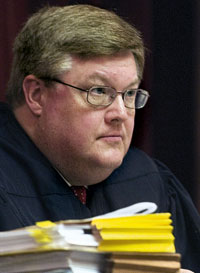Limiting money in America’s courts
WHAT happened in West Virginia would have been unthinkable in most other countries. In 2004 Don Blankenship, the chief executive of Massey Energy, spent $3m to help elect Brent Benjamin to the state Supreme Court. Three years later Mr Benjamin voted to overturn a $50m claim against Massey. The case is an extreme example of an American reality. Thirty-nine states elect at least some of their judges: so although judges do not have constituents, they have contributors. On June 8th the Supreme Court in Washington, DC, decided by five votes to four that the West Virginia case went too far.
This is the first time that the distinguished justices have ventured into the muddy business of money in judicial elections. Hugh Caperton, whose firm was allegedly bankrupted by Massey through fraud, argued that he had been denied a fair trial. The Supreme Court agreed, with Anthony Kennedy writing that Mr Benjamin’s failure to recuse himself had created an unconstitutional “probability of bias”. Caperton v Massey is a first step on a long and bumpy road.
Judicial elections have got rougher. Trial lawyers and business groups—and Democrats and Republicans—have seized on judges as weapons in their wars. Between 2000 and 2007 state Supreme Court contests raised $168m, more than twice the amount raised in the 1990s. But despite all that money, it is usually left to judges themselves to decide if there may be a danger of bias, and to remove themselves if there is. And some do not.
 Benjamin judged himself innocent
Benjamin judged himself innocentCaperton will at last set a constitutional ceiling on this rising frenzy. The court ruled that the scale of Mr Blankenship’s spending (300% more than Mr Benjamin’s campaign) and its timing (as Massey waited for an appeal) should have required Mr Benjamin to step aside.
Yet much uncertainty remains. The dissenting justices listed 40 troubling questions. How much money is too much? Are judges biased against those who opposed their election? How long does a probability of bias last? What about spending not by an individual but by a group?
Resolving such questions is still a matter for the individual states. Rebecca Kourlis, a former member of Colorado’s Supreme Court, thinks judicial elections should be scrapped. This will take time. Amending a state’s constitution is a slow process, and even though most Americans believe contributions influence courts, they still prefer judicial elections to appointment or nomination by committee.
If elections are to remain, states can at least try to fight their most pernicious effects. Tightening rules for recusal would help, says James Sample of New York University’s Brennan Centre. An independent commission, for instance, could decide whether a judge should step aside. Mr Benjamin found he was unbiased after deliberating with himself.
Some states are considering reform. Caperton may encourage them. The ruling saved courts from a free-for-all, but there is still plenty of room for confusion.
